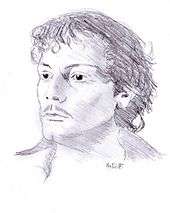Beau-père
| Beau-père | |
|---|---|
 French film poster, which caused controversy upon the film's release. | |
| Directed by | Bertrand Blier |
| Produced by | Alain Sarde |
| Written by | Bertrand Blier |
| Starring |
Patrick Dewaere Ariel Besse Maurice Ronet Nathalie Baye Geneviève Mnich |
| Music by | Philippe Sarde |
| Cinematography | Sacha Vierny |
| Edited by | Claudine Merlin |
| Distributed by | Parafrance Films |
Release dates | 16 September 1981 |
Running time | 123 minutes |
| Country | France |
| Language | French |
Beau-père (anglicized to Beau Pere or Stepfather) is a 1981 French comedy-drama[1] film directed by Bertrand Blier, based on his novel of the same name. It stars Patrick Dewaere, Ariel Besse and Maurice Ronet and is about a 30-year-old pianist who has an affair with his 14-year-old stepdaughter after her mother dies in a car accident.
The film played at the 1981 Cannes Film Festival and had an international release. It received some positive reviews in spite of its controversial subject.
Plot
Rémi is a struggling pianist with a wife named Martine, a model who is getting too old to find desirable work, and a 14-year-old stepdaughter Marion. When Martine is killed in a car crash, Marion expresses her desire to stay with Rémi in their apartment, but is taken away by her father Charly, an alcoholic who dislikes Rémi. Marion comes back, much to her father's disapproval, and takes up babysitting to help make ends meet while Rémi gives piano lessons. Soon, Marion tells Rémi she is physically attracted to him, but he resists her advances because of her young age.
When Marion proves to be anemic, she is sent to the mountains with her father while Rémi loses his apartment and moves in with friends. A broken man, he meets with Marion and they have sex in a hotel. She comes back to live with him in a run-down and condemned house, and although he first resists any more sex, gradually gives in. While visiting, Marion's father at one point sees the two embrace. He asks them if they are having an affair, but when Rémi objects, Charly apologizes and leaves. Eventually Rémi takes interest in an older woman, Charlotte, who is also a more skilled piano player, while Marion also seeks out a substitute for him and moves back in with her father.
Cast
- Patrick Dewaere as Rémi
- Ariel Besse as Marion
- Maurice Ronet as Charly
- Geneviève Mnich as Simone
- Maurice Risch as Nicolas
- Macha Méril as Birthday Hostess
- Rose Thiéry as Mme Doullens, Landlord's wife
- Pierre Le Rumeur as Pediatrician
- Yves Gasc as M. Doullens, Landlord
- Michel Berto as Professor
- Catherine Alcover as Emergency Doctor
- Henri-Jacques Huet as Restaurant manager
- Jacques Rispal as Taxi driver
- Nathalie Baye as Charlotte
- Nicole Garcia as Martine
- Maurice Biraud as Truck driver, accident witness
- Joseph Michael Roth as Marion's friend (uncredited)
- Sandy Whitelaw as The father of the young girl (birthday) (uncredited)
Production
Development

Writer and director Bertrand Blier declared Beau Pere was intended as "an ode to the fair sex and to womanhood in its purest form."[2] Like Blier's earlier film Going Places (1974), he based it on a novel he had written, also titled Beau-père.[3]
The film was shot in Sèvres and Ville-d'Avray. The bass played by Maurice Risch's character is performed by musician Stéphane Grappelli.[4]
Casting
The film stars Patrick Dewaere, and is one of his last films.[5] He had appeared in Blier's films before, though never without Gérard Depardieu.[6] Actress Nathalie Baye described her role as small, but said working with Blier and producer Alain Sarde was educational, and Blier managed to both listen to others while having a vision of what he wanted to shoot.[7]
Beau Pere also stars Ariel Besse in her first film role,[8] and she was 15 at the time.[9] Although she is nude in the film, her parents gave approval, saying she was treated sensitively.[10] Besse secured the role after Sophie Marceau turned it down.[11]
Release
The film was entered into the Cannes Film Festival in May 1981.[12] It had a total of 1,197,816 admissions in France,[13] with Blier claiming the poster chosen by the distributor was awkward and discouraged the public from seeing the film.[14] Besse's parents sued the distributors and producers over the poster, which shows Besse's breasts, as it was placed on billboards around France without their permission. The judge favoured the producers, saying the film was more revealing than the poster.[10] Beau Pere was among Blier's least commercially successful films.[15]
The film played at the New York Film Festival in October 1981.[16] The film was released in the U.K. as Stepfather and in the U.S. as Beau Pere.[17] In Canada, the film was banned in the province of Ontario but approved for Quebec and British Columbia, and was a particularly controversial case concerning censorship and community standards.[18]
Reception
Critical reception

The film has received positive reviews. Dave Kehr of the Chicago Reader observes similarities to Lolita and says Beau Pere "has enough of Blier's customary taboo-busting vigor to provide a reasonably unsettling good time."[5] Janet Maslin of The New York Times wrote in 1981 that despite the objectionable subject matter, "Mr. Blier tells this story very gently, with as much attention to the humor of the situation as to its eroticism." She also stated Besse played the character as an "extremely changeable creature, childish one minute and precocious the next."[2] People called the film convincing and touching, and in spite of the topic, not pornographic.[19] Lloyd Paseman, writing for the The Register-Guard, compared the film to Blier's earlier Get Out Your Handkerchiefs in its subject matter, but said Beau Pere was better, with Dewaere being "excellent" and Besse being "The main reason to see Beau Pere," comparing her to Brooke Shields.[9] Conversely, David Denby of New York magazine panned the film as "heavy-handed and sluggish."[20]
In his 2002 Movie & Video Guide, Leonard Maltin gives the film three and a half stars and calls it thoughtful and sensitive.[1] James Berardinelli of ReelViews credits the film with a "provocative script featuring well-defined characters and a pair of powerful performances."[8] Time Out dismissed the film as "polite porn,"[21] while Voir magazine notes the film may be shocking decades later.[22] Rotten Tomatoes counted four favourable reviews out of five.[23]
Accolades
Beau Pere competed for the Palme d'Or at Cannes, but did not win.[24] Author Rémi Fournier Lanzoni highlighted Beau Pere and Série noire in noting Dewaere never received the César Award for Best Actor.[25]
| Award | Category | Recipient(s) | Result | Ref(s) |
|---|---|---|---|---|
| Boston Society of Film Critics | Best Foreign Language Film | Beau Pere, shared with Taxi zum Klo | Won | [26] |
| César Awards | Best Actor | Patrick Dewaere | Nominated | [27] |
References
- 1 2 Leonard Maltin, ed., Leonard Maltin's 2002 Movie & Video Guide. A Signet Book, 2001, p. 97.
- 1 2 Maslin, Janet (9 October 1981). "'BEAU PERE,' BY BERTRAND BLIER". The New York Times. Retrieved 2 March 2013.
- ↑ Sue Harris, Bertrand Blier, Manchester University Press, 2001, p. 13.
- ↑ "BEAU-PÈRE". Le Monde des Avengers. Retrieved 3 September 2016.
- 1 2 Kehr, Dave (1999). "Beau Pere". Chicago Reader. Retrieved 1 March 2013.
- ↑ Harris, pp. 13-14.
- ↑ Louise, Tristan (23 January 2015). "Nathalie Baye : « La rencontre avec Blier et Delon m'a beaucoup marquée »". Angers Mag. Retrieved 7 September 2016.
- 1 2 Berardinelli, James (1999). "Beau Pere". ReelViews. Archived from the original on 19 December 2010. Retrieved 1 March 2013.
- 1 2 Lloyd Paseman, "'Beau Pere' romantic comedy with man-child sexual theme," The Register-Guard, 4 March 1982, p. 8D.
- 1 2 Eder, Richard (29 November 1981). "THE TEEN-AGER AS SEX OBJECT- ART OR EXPLOITATION?". The New York Times. Retrieved 2 September 2016.
- ↑ « Les bonheurs de Sophie Marceau: deux films, 15 millions d’admirateurs et la gloire à 16 ans », France-Soir, no. 11990, 5 March 1983.
- ↑ "Festival de Cannes: Beau-père". festival-cannes.com. Archived from the original on 2012-03-08. Retrieved 2009-05-31.
- ↑ "Beau père". JP's Box-Office. Retrieved 2 September 2016.
- ↑ Carrière, Christophe (23 August 2010). "Bertrand Blier commente sa filmographie". L'Express. Retrieved 2 September 2016.
- ↑ Harris, p. 14.
- ↑ Janet Maslin, "Film deals with stepfather-stepdaughter affair," The Day, 9 October 1981, p. 19.
- ↑ Philippe Rège, Encyclopedia of French Film Directors, Volume 1, The Scarecrow Press, 2010, p. 30.
- ↑ Neil Boyd, Censorship and Obscenity: Jurisdiction and the Boundaries of Free Expression, Osgoode Hall Law Journal, Volume 23, Number 1 (Spring 1985), p. 56.
- ↑ "Picks and Pans Review: Beau Pere," People, November 30, 1981, Vol. 16, No. 22.
- ↑ David Denby, "Little Girl Blues," New York, November 2, 1981, p. 58.
- ↑ TM, Time Out Film Guide, Time Out Guides, 2011, p. 1017.
- ↑ Gobert, Céline (29 January 2016). "MARCEL JEAN : VAGUE DE CHALEUR À LA CINÉMATHÈQUE". Voir. Retrieved 7 September 2016.
- ↑ "Beau Père (1981)". Rotten Tomatoes. Retrieved 1 March 2013.
- ↑ "Bertrand Blier". AlloCiné. Retrieved 3 September 2016.
- ↑ Rémi Fournier Lanzoni, French Cinema: From Its Beginnings to the Present, Bloomsbury, 2005, p. 288.
- ↑ "Past Award Winners". Boston Society of Film Critics. Retrieved 1 March 2013.
- ↑ "Prix et nominations : César 1982". AlloCiné. Retrieved 3 September 2016.
External links
- Beau-père at the Internet Movie Database